
Telecommunications company Dycom (NYSE: DY) beat Wall Street’s revenue expectations in Q3 CY2024, with sales up 12% year on year to $1.27 billion. On top of that, next quarter’s revenue guidance ($1.22 billion at the midpoint) was surprisingly good and 13.9% above what analysts were expecting. Its non-GAAP profit of $2.68 per share was 16.1% above analysts’ consensus estimates.
Is now the time to buy Dycom? Find out by accessing our full research report, it’s free.
Dycom (DY) Q3 CY2024 Highlights:
- Revenue: $1.27 billion vs analyst estimates of $1.22 billion (12% year-on-year growth, 4.3% beat)
- Adjusted EPS: $2.68 vs analyst estimates of $2.31 (16.1% beat)
- Adjusted EBITDA: $170.7 million vs analyst estimates of $161.7 million (13.4% margin, 5.6% beat)
- Revenue Guidance for Q4 CY2024 is $1.22 billion at the midpoint, above analyst estimates of $1.07 billion
- Operating Margin: 12.1%, up from 10.5% in the same quarter last year
- Market Capitalization: $5.90 billion
Company Overview
Working alongside some of the most popular mobile carriers in the world, Dycom (NYSE: DY) builds and maintains telecommunications infrastructure.
Engineering and Design Services
Companies providing engineering and design services boast ever-evolving technical expertise. Compared to their counterparts who manufacture and sell physical products, these companies can also pivot faster to more trending areas due to their smaller physical asset bases. Green energy and water conservation, for example, are current themes driving incremental demand in this space. On the other hand, those providing engineering and design services are at the whim of construction and infrastructure project volumes, which tend to be cyclical and can be impacted heavily by economic factors such as interest rates.
Sales Growth
Reviewing a company’s long-term sales performance reveals insights into its quality. Any business can have short-term success, but a top-tier one sustains growth for years. Unfortunately, Dycom’s 6.4% annualized revenue growth over the last five years was mediocre. This fell short of our benchmark for the industrials sector, but there are still things to like about Dycom.
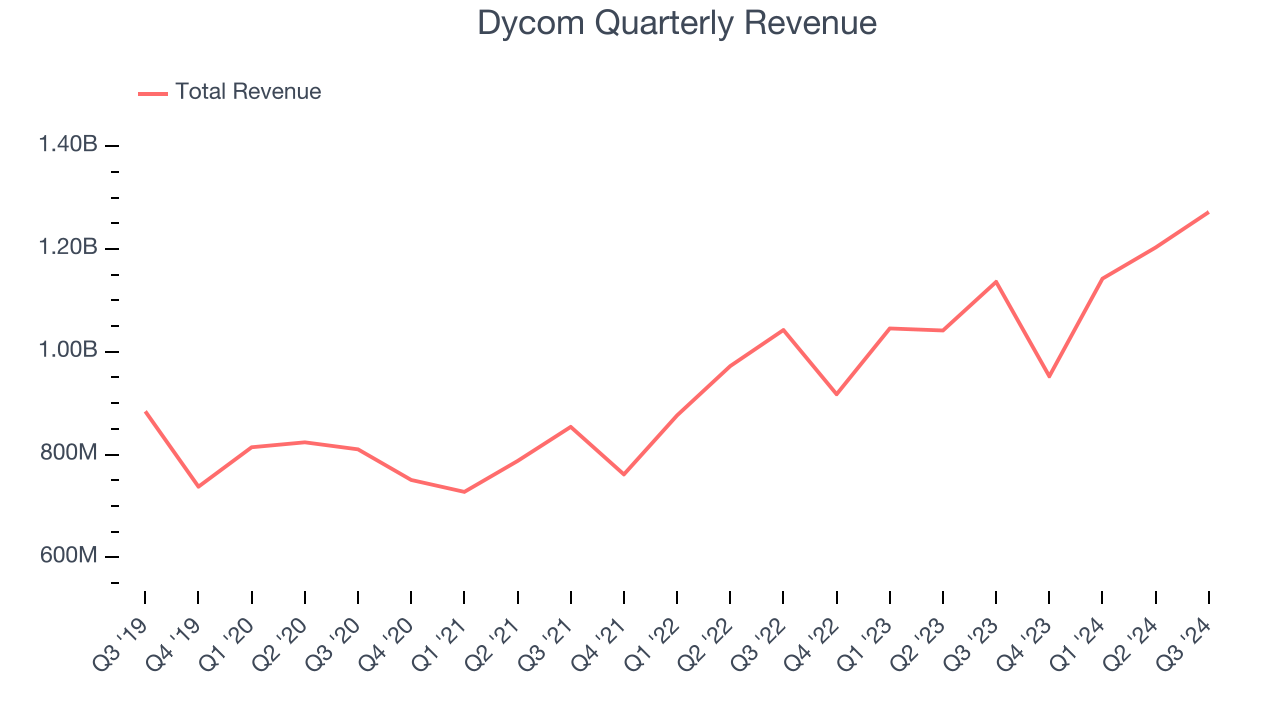
Long-term growth is the most important, but within industrials, a half-decade historical view may miss new industry trends or demand cycles. Dycom’s annualized revenue growth of 11.9% over the last two years is above its five-year trend, suggesting its demand recently accelerated. 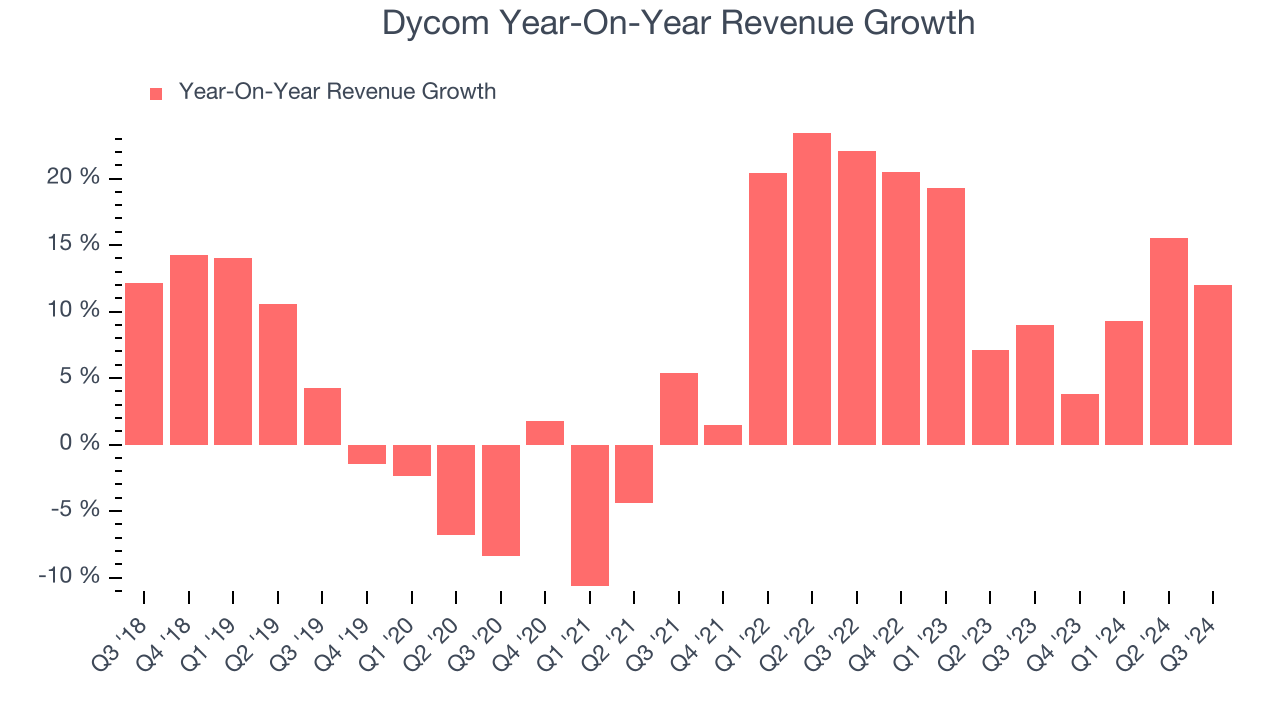
This quarter, Dycom reported year-on-year revenue growth of 12%, and its $1.27 billion of revenue exceeded Wall Street’s estimates by 4.3%. Company management is currently guiding for a 27.6% year-on-year increase in sales next quarter.
Looking further ahead, sell-side analysts expect revenue to grow 12.9% over the next 12 months, similar to its two-year rate. This projection is admirable and suggests the market sees some success for its newer products and services.
Today’s young investors won’t have read the timeless lessons in Gorilla Game: Picking Winners In High Technology because it was written more than 20 years ago when Microsoft and Apple were first establishing their supremacy. But if we apply the same principles, then enterprise software stocks leveraging their own generative AI capabilities may well be the Gorillas of the future. So, in that spirit, we are excited to present our Special Free Report on a profitable, fast-growing enterprise software stock that is already riding the automation wave and looking to catch the generative AI next.
Operating Margin
Dycom was profitable over the last five years but held back by its large cost base. Its average operating margin of 5.5% was weak for an industrials business. This result isn’t too surprising given its low gross margin as a starting point.
On the plus side, Dycom’s annual operating margin rose by 6.2 percentage points over the last five years.
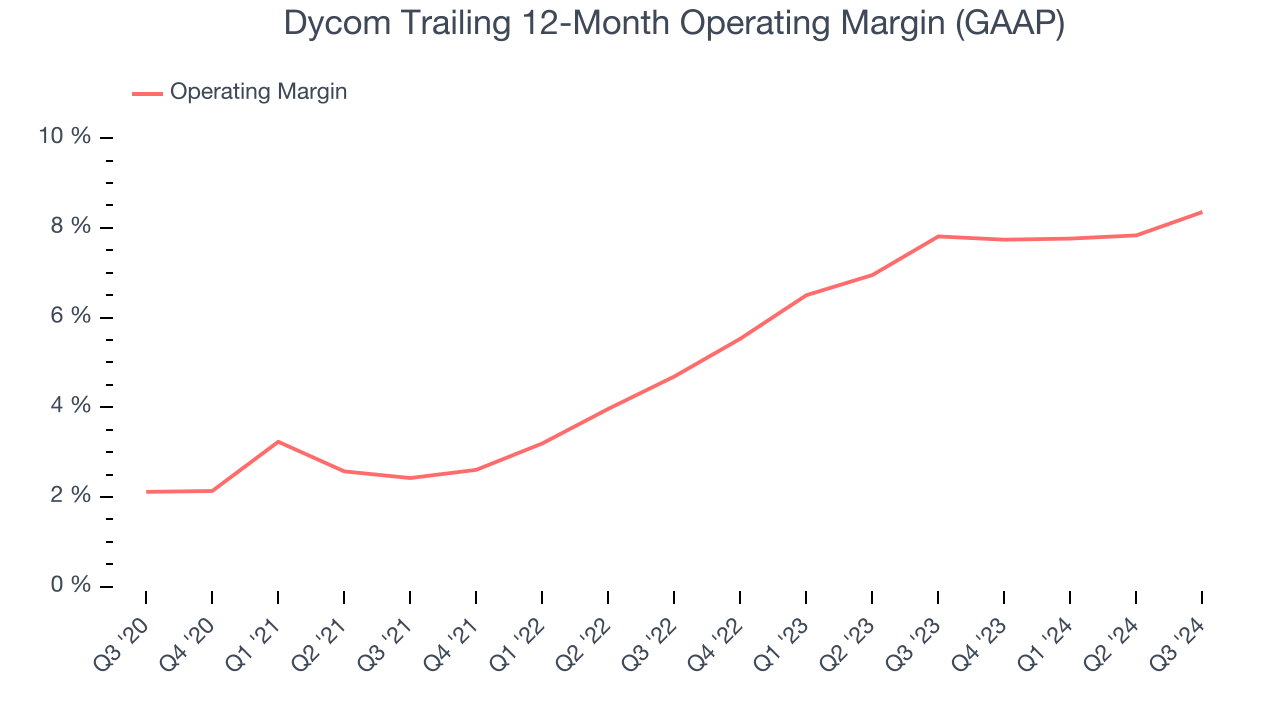
This quarter, Dycom generated an operating profit margin of 12.1%, up 1.6 percentage points year on year. The increase was encouraging, and since its gross margin actually decreased, we can assume it was recently more efficient because its operating expenses like marketing, R&D, and administrative overhead grew slower than its revenue.
Earnings Per Share
Revenue trends explain a company’s historical growth, but the long-term change in earnings per share (EPS) points to the profitability of that growth – for example, a company could inflate its sales through excessive spending on advertising and promotions.
Dycom’s EPS grew at an astounding 25.3% compounded annual growth rate over the last five years, higher than its 6.4% annualized revenue growth. This tells us the company became more profitable on a per-share basis as it expanded.
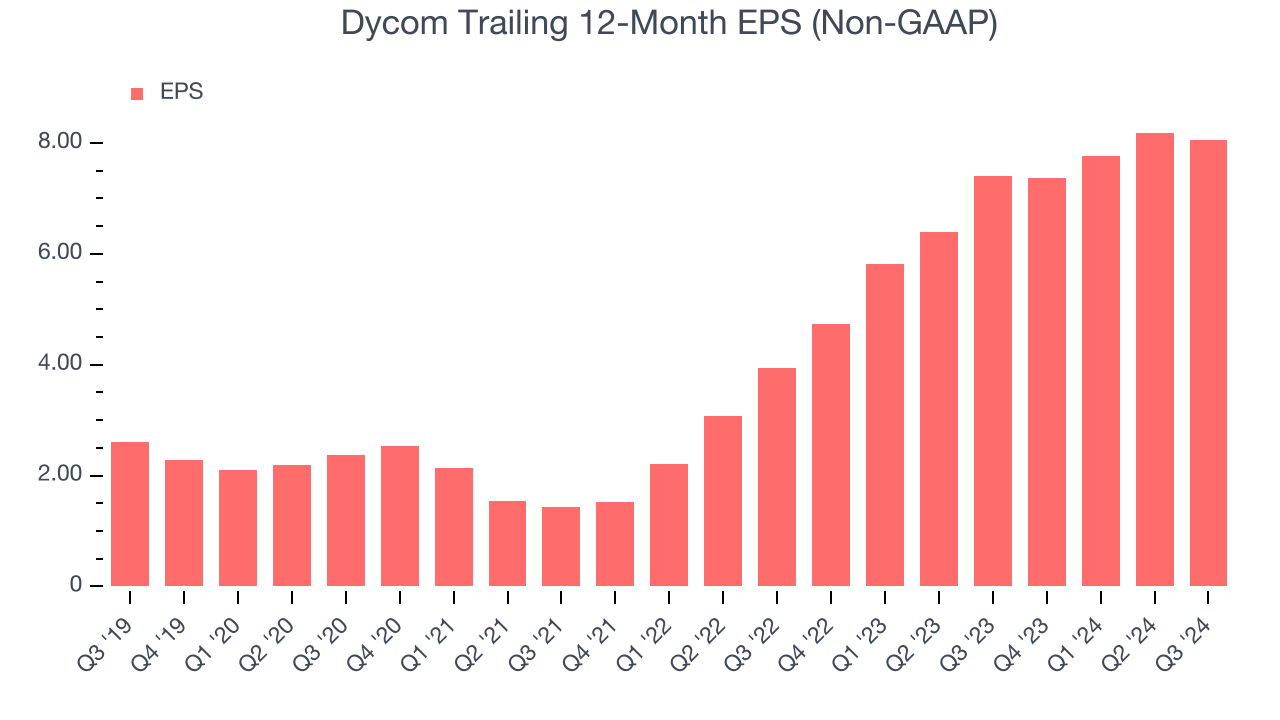
Diving into the nuances of Dycom’s earnings can give us a better understanding of its performance. As we mentioned earlier, Dycom’s operating margin expanded by 6.2 percentage points over the last five years. On top of that, its share count shrank by 7.4%. These are positive signs for shareholders because improving profitability and share buybacks turbocharge EPS growth relative to revenue growth. 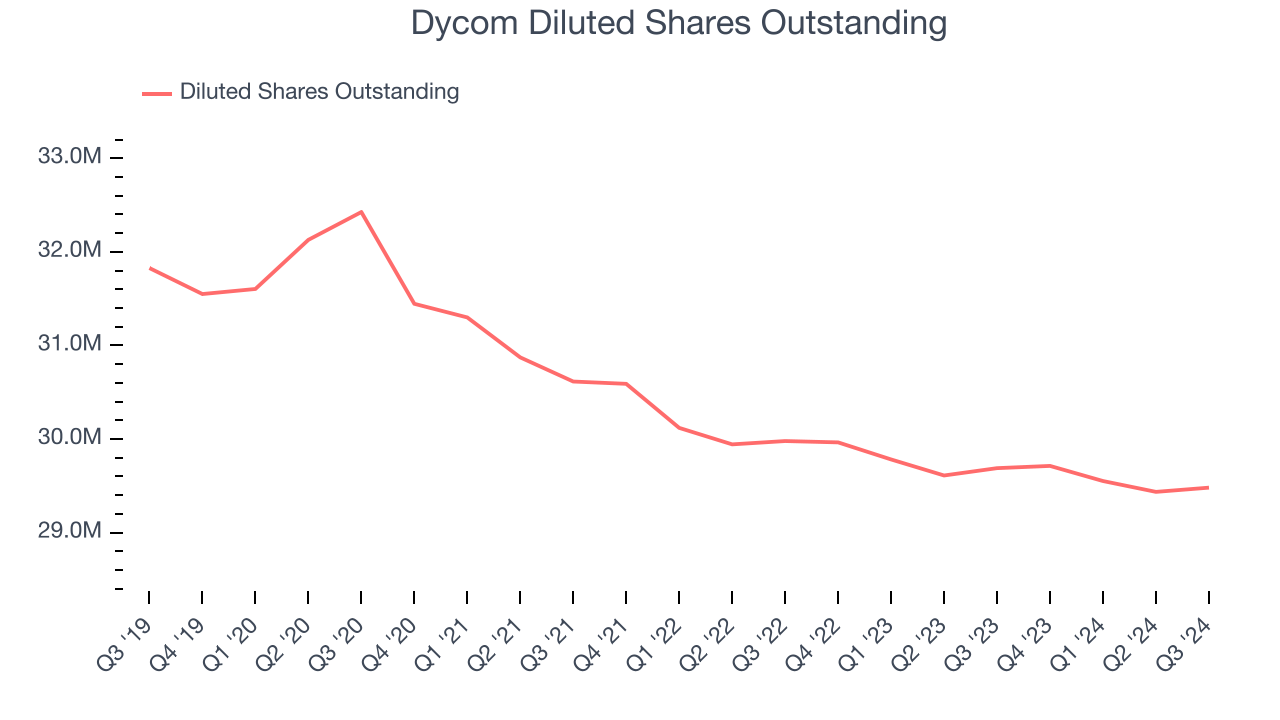
Like with revenue, we analyze EPS over a shorter period to see if we are missing a change in the business.
For Dycom, its two-year annual EPS growth of 43% was higher than its five-year trend. We love it when earnings growth accelerates, especially when it accelerates off an already high base.In Q3, Dycom reported EPS at $2.68, down from $2.82 in the same quarter last year. Despite falling year on year, this print easily cleared analysts’ estimates. Over the next 12 months, Wall Street expects Dycom’s full-year EPS of $8.05 to grow by 13.5%.
Key Takeaways from Dycom’s Q3 Results
We were impressed by how significantly Dycom blew past analysts’ revenue, EBITDA, and EPS expectations this quarter. We were also glad its revenue guidance for next quarter came in higher than Wall Street’s estimates. Zooming out, we think this was a good quarter with some key areas of upside. The stock traded up 1.2% to $205 immediately after reporting.
Dycom put up rock-solid earnings, but one quarter doesn’t necessarily make the stock a buy. Let’s see if this is a good investment. When making that decision, it’s important to consider its valuation, business qualities, as well as what has happened in the latest quarter. We cover that in our actionable full research report which you can read here, it’s free.




